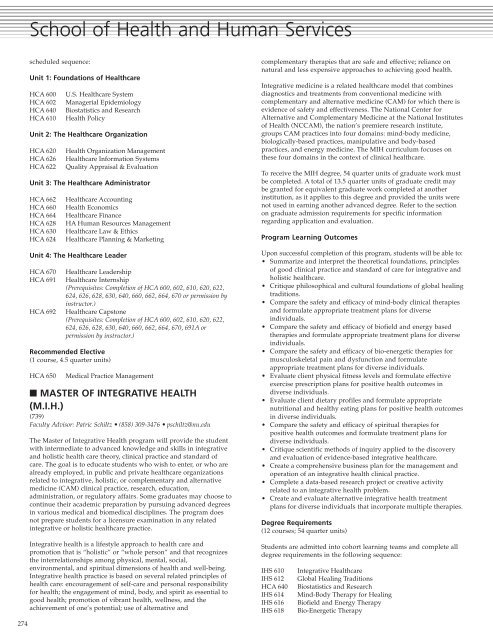Catalog 73 - National University
Catalog 73 - National University
Catalog 73 - National University
- No tags were found...
Create successful ePaper yourself
Turn your PDF publications into a flip-book with our unique Google optimized e-Paper software.
School of Health and Human Servicesscheduled sequence:Unit 1: Foundations of HealthcareHCA 600HCA 602HCA 640HCA 610U.S. Healthcare SystemManagerial EpidemiologyBiostatistics and ResearchHealth PolicyUnit 2: The Healthcare OrganizationHCA 620HCA 626HCA 622Health Organization ManagementHealthcare Information SystemsQuality Appraisal & EvaluationUnit 3: The Healthcare AdministratorHCA 662HCA 660HCA 664HCA 628HCA 630HCA 624Healthcare AccountingHealth EconomicsHealthcare FinanceHA Human Resources ManagementHealthcare Law & EthicsHealthcare Planning & MarketingUnit 4: The Healthcare LeaderHCA 670HCA 691HCA 692Healthcare LeadershipHealthcare Internship(Prerequisites: Completion of HCA 600, 602, 610, 620, 622,624, 626, 628, 630, 640, 660, 662, 664, 670 or permission byinstructor.)Healthcare Capstone(Prerequisites: Completion of HCA 600, 602, 610, 620, 622,624, 626, 628, 630, 640, 660, 662, 664, 670, 691A orpermission by instructor.)Recommended Elective(1 course, 4.5 quarter units)HCA 650Medical Practice Management■ MASTER OF INTEGRATIVE HEALTH(M.I.H.)(<strong>73</strong>9)Faculty Advisor: Patric Schiltz • (858) 309-3476 • pschiltz@nu.eduThe Master of Integrative Health program will provide the studentwith intermediate to advanced knowledge and skills in integrativeand holistic health care theory, clinical practice and standard ofcare. The goal is to educate students who wish to enter, or who arealready employed, in public and private healthcare organizationsrelated to integrative, holistic, or complementary and alternativemedicine (CAM) clinical practice, research, education,administration, or regulatory affairs. Some graduates may choose tocontinue their academic preparation by pursuing advanced degreesin various medical and biomedical disciplines. The program doesnot prepare students for a licensure examination in any relatedintegrative or holistic healthcare practice.Integrative health is a lifestyle approach to health care andpromotion that is “holistic” or “whole person” and that recognizesthe interrelationships among physical, mental, social,environmental, and spiritual dimensions of health and well-being.Integrative health practice is based on several related principles ofhealth care: encouragement of self-care and personal responsibilityfor health; the engagement of mind, body, and spirit as essential togood health; promotion of vibrant health, wellness, and theachievement of one’s potential; use of alternative andcomplementary therapies that are safe and effective; reliance onnatural and less expensive approaches to achieving good health.Integrative medicine is a related healthcare model that combinesdiagnostics and treatments from conventional medicine withcomplementary and alternative medicine (CAM) for which there isevidence of safety and effectiveness. The <strong>National</strong> Center forAlternative and Complementary Medicine at the <strong>National</strong> Institutesof Health (NCCAM), the nation’s premiere research institute,groups CAM practices into four domains: mind-body medicine,biologically-based practices, manipulative and body-basedpractices, and energy medicine. The MIH curriculum focuses onthese four domains in the context of clinical healthcare.To receive the MIH degree, 54 quarter units of graduate work mustbe completed. A total of 13.5 quarter units of graduate credit maybe granted for equivalent graduate work completed at anotherinstitution, as it applies to this degree and provided the units werenot used in earning another advanced degree. Refer to the sectionon graduate admission requirements for specific informationregarding application and evaluation.Program Learning OutcomesUpon successful completion of this program, students will be able to:• Summarize and interpret the theoretical foundations, principlesof good clinical practice and standard of care for integrative andholistic healthcare.• Critique philosophical and cultural foundations of global healingtraditions.• Compare the safety and efficacy of mind-body clinical therapiesand formulate appropriate treatment plans for diverseindividuals.• Compare the safety and efficacy of biofield and energy basedtherapies and formulate appropriate treatment plans for diverseindividuals.• Compare the safety and efficacy of bio-energetic therapies formusculoskeletal pain and dysfunction and formulateappropriate treatment plans for diverse individuals.• Evaluate client physical fitness levels and formulate effectiveexercise prescription plans for positive health outcomes indiverse individuals.• Evaluate client dietary profiles and formulate appropriatenutritional and healthy eating plans for positive health outcomesin diverse individuals.• Compare the safety and efficacy of spiritual therapies forpositive health outcomes and formulate treatment plans fordiverse individuals.• Critique scientific methods of inquiry applied to the discoveryand evaluation of evidence-based integrative healthcare.• Create a comprehensive business plan for the management andoperation of an integrative health clinical practice.• Complete a data-based research project or creative activityrelated to an integrative health problem.• Create and evaluate alternative integrative health treatmentplans for diverse individuals that incorporate multiple therapies.Degree Requirements(12 courses; 54 quarter units)Students are admitted into cohort learning teams and complete alldegree requirements in the following sequence:IHS 610IHS 612HCA 640IHS 614IHS 616IHS 618Integrative HealthcareGlobal Healing TraditionsBiostatistics and ResearchMind-Body Therapy for HealingBiofield and Energy TherapyBio-Energetic Therapy274
















